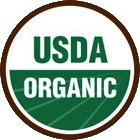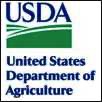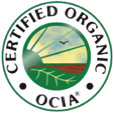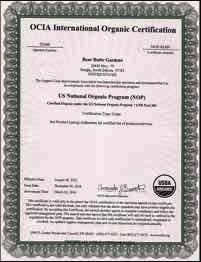Bear Butte Gardens
Bear Butte Gardens is USDA Organic Certified!

What is USDA Organic Certification?
The United States Congress passed the Organic Foods Production Act (OFPA) in 1990 to establish uniform national standards for the production and handling of foods labeled as "organic." The Act authorized a new USDA National Organic Program (NOP) to set national standards for the production, handling, and processing of organically grown agricultural products. All producers who use the "USDA Organic" label must undergo USDA inspection and certification.
Learn more about the USDA National Organic Program
In a nutshell, USDA-approved organic farms:
- must document an audit trail from farm to table
- must be inspected annually
- cannot use conventional (chemical-based) pesticides
- cannot use ionizing radiation
- cannot use synthetic (chemical-based) fertilizers
- cannot use sewage sludge
- cannot produce genetically modified plants
Organically raised animals:
- cannot consume antibiotics
- cannot consume growth hormones
- must eat organic food
- must have access to the outdoors
- cannot be genetically modified

In addition to the above high-level requirements, there are many, many more rules regulating production methods and materials that must be followed. To give a few examples: no treated lumber can be used near any vegetables or animals, compost piles must be turned on a specific schedule and must reach specific temperatures, farm equipment must be cleaned to specific standards, crops must follow specific rotation requirements and schedules, pests (e.g., insects, diseases, varmints, etc.) must be controlled via specific materials and methods, and nearly everything must be documented and audited.
Most people who have not completed the certification process have very little idea about the detailed requirements or about the high quality of the product that is a result.
Learn more about the US Department of Agriculture

Our Certification Process
Bear Butte Gardens is very proud to be USDA Organic Certified since 2012! Each year in March we complete and submit our organic certification paperwork to our organic certifier, Organic Crop Improvement Association (OCIA). Each summer an inspector visits our farm for several hours, asking many questions, looking at everything, and taking a lot of notes. Late summer/early fall we receive our official USDA National Organic Program certificate in the mail.
Some people ask why be certified? Why pay the annual fee? Why go through the hassle of the paperwork, documentation, and audit trail? Why go through the inspection process? Why not simply grow vegetables without chemicals and say the vegetables are “naturally grown” or “organically grown”, or “beyond organic” (but not technically organic certified)? Well, the answer has three parts:
- We don’t want to confuse or deceive our customers with word trickery. We are the real deal.
- How could we say we are “beyond organic” if we are not at least organic certified? We are both.
- The actual certification process has so many rules and regulations that, if you have not actually gone through the process and are not held to the standards by annual inspections, it would be very easy to miss something -- either by not knowing the actual detailed rules, or by bending the rules a little. We talk-the-talk and walk-the-walk.
